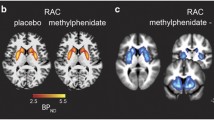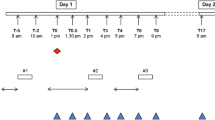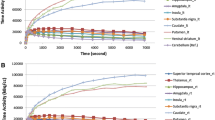Abstract.
Rationale: Dopamine D2 receptor upregulation in the striatum is regularly seen in response to the administration of traditional antipsychotics in animal experiments. This is associated with hyperactivity and, for this reason, D2 receptor upregulation has long been postulated as central to tardive dyskinesia (TD). Objective: Using positron emission tomography (PET), the present study attempted to determine whether antipsychotic-induced D2 receptor up-regulation also occurs in humans. Methods: The long-term effects of traditional and novel antipsychotics on dopamine D2 receptors were investigated in nine subjects meeting DSM-IV criteria for schizophrenia who were deemed eligible for temporary treatment washout. Subjects had been treated with traditional antipsychotics (haloperidol n=3, perphenazine n=1) and novel antipsychotics (risperidone n=3, olanzapine n=2) in the moderate to high dosage range. Fourteen days after treatment withdrawal, the binding potentials (BPs) of dopamine D2 receptors were measured using 11[C] raclopride. The obtained BPs were compared to the BPs from antipsychotic-naive control subjects with schizophrenia. Results: There was a significant increase in the D2 BP in both groups combined that reached 34%. The increases in the D2 BPs in the groups treated with conventional and novel antipsychotics were 37% and 31%, respectively. Significantly, the patients showing the highest degree of D2 receptor upregulation (98%) developed severe and persistent TD shortly after being started on a new antipsychotic with low affinity for D2 receptors. Conclusion: This study demonstrates for the first time, using in vivo neuroreceptor imaging, that dopamine D2 receptor binding is increased after long-term treatment with antipsychotics in humans. The data suggest that both traditional and novel antipsychotics with high affinity for dopamine D2 receptors are associated with a substantial increase in D2 receptor binding. The present data in humans agree well with animal data that implicate D2 receptor-mediated mechanisms in motor hyperactivity.
Similar content being viewed by others
Author information
Authors and Affiliations
Additional information
Electronic Publication
Rights and permissions
About this article
Cite this article
Silvestri, S., Seeman, M., Negrete, JC. et al. Increased dopamine D2 receptor binding after long-term treatment with antipsychotics in humans: a clinical PET study. Psychopharmacology 152, 174–180 (2000). https://doi.org/10.1007/s002130000532
Received:
Accepted:
Issue Date:
DOI: https://doi.org/10.1007/s002130000532




